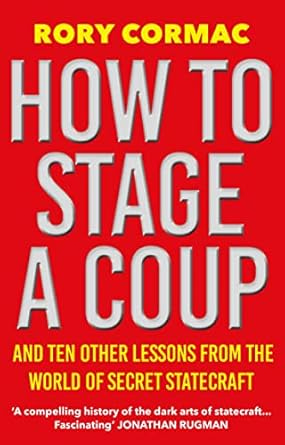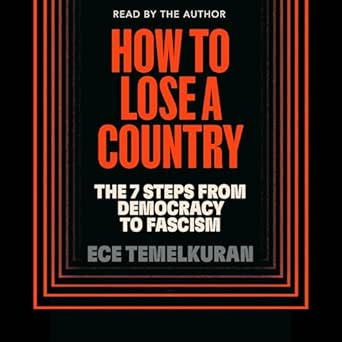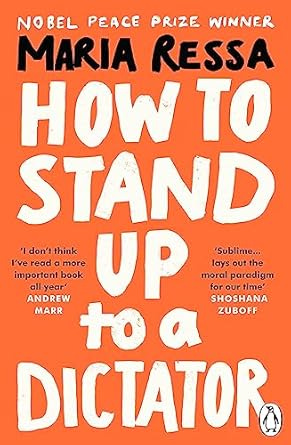You Need To Read These Three Books Now: Before Trump Burns Them.
Three books—Rory Cormac’s How to Stage a Coup, Ece Temelkuran’s How to Lose a Country, and Maria Ressa’s How to Stand Up to a Dictator—can help Americans prepare for what comes next.
“The book you don't read won't help”
Jim Rohn
What hope can we give to Americans reeling from the speed of the collapse of their democracy and civil liberties? This -
You are not starting from scratch. Others have been through this. This feels unprecedented, but it is not unknown .
These three books—Rory Cormac’s How to Stage a Coup, Ece Temelkuran’s How to Lose a Country, and Maria Ressa’s How to Stand Up to a Dictator—will help you understand what's going on, and plan how to resist.
I'm an introvert and a bibliophile. I have a library, an overflow library, and still seem to have piles of books everywhere, not to mention audio-books I need to get through at *1.75 speed, and still a growing backlog. Right now I am revisiting three books I think have important lessons for Americans to read right now - not just Democrats and the left; but Regretful Republicans and Trumpers who have FAFO’d.
The best time to read these was pre-election. The second-best time is now.
Each book offers an informed perspective on how power is seized, abused, and resisted. Together, they provide some light for understanding what has happened, how its happening, and suggest ways to start fighting back against Fascist authoritarianism.
It's no coincidence that two of these books are from world-class Journalists - because attacking the media is a core part of the dictatorial strategy.
1. How to Stage a Coup – Rory Cormac
"The most successful coups do not require a single shot to be fired. They unfold in whispers, leaks, and quiet compromises."
Rory Cormac
Rory Cormac is a Professor of International Relations at the University of Nottingham and a world leading expert on intelligence, espionage, covert action, and political deception. He has also spoken at the UK Cabinet Office, Home Office and Ministry of Defence, and the US State Department and Pentagon.
This book examines how coups, assassinations, and subversions have shaped history— importantly, not just through violent military takeovers, but through subtler, shadowy means.
From Cold War-era destabilisation to modern online influence campaigns, Cormac examines how absolute power can be seized without the public ever realising it until it's too late. The chapters use real examples to talk through assassinations, influence campaigns, government subversion, undermining democracy and election rigging and more.
Going by the case history examples - many coups seem to be directed by foreign powers. Suggestive now - given Trump's links to Putin.
What defends a nation from Authoritarian coups? - an engaged, informed populace and policies led by experts. So it follows that what weakens a nation is a cowed, misled populace - with education unfunded, and policies deliberately separated from science - in other words, Project 2025
🔑 Key Takeaways:
Coups are not always military-led. More power grabs rely on deception, disinformation, and gradual erosion of democracy rather than outright ‘tanks on the streets’ violence.
Intelligence agencies play a key role in shaping political landscapes. Foreign Governments use covert influence operations to sway elections, destabilise rivals, and prop up favoured leaders in target countries. Five Eyes, China, Russia and more have done this. The US has done it elsewhere for a century.
Modern coups don’t need tanks—just a good PR strategy. In our online world, controlling the narrative is more effective than using brute force.
That makes it clear why Musk bought Twitter: an utter shambles as a business move, a victory in narrative control and manipulation. That's why Murdoch, before him, monopolised media to set political agendas. That's why Zuckerberg had a whole department claiming it delivered landslide elections, and why when Bezos bought the Washington Post it suddenly didn’t endorse a candidate.
This book can help set your situational awareness of what has happened.
2. How to Lose a Country – Ece Temelkuran
"You don’t wake up one day and find yourself in a dictatorship. It happens slowly, while people are still laughing at the absurdity of it all."
– Ece Temelkuran
In How to Lose a Country, Turkish journalist Ece Temelkuran dissects the rise of authoritarian populism, drawing directly from her own experiences in Turkey with the rise of Trump fan Erdogan as well as parallels with Brexit. Where Cormac focussed on external malign influences, this is a close up and dirty look at the process from within a country.
She identifies seven steps that signal a nation’s descent into dictatorship, from how they set up, not a traditional political party, but a ‘movement’. Carry out attacks on the free press, the glorification of a "strongman" leader, the new morality - it's all laid bare.
You think it can't happen here -until it does.
🔑 Key Takeaways:
Autocrats follow a playbook. Across the world, populist leaders use the same tactics—attacking the media, demonising opponents, and undermining democratic institutions.
Democracy is not as secure as we think. Even seemingly stable ‘democratic’ countries can rapidly slide into authoritarianism. Democratic norms are simply steamrollered.
Resistance needs to be proactive, not reactive. By the time people realise their democracy is in danger, it may already be too late. But even when it is too late still you must resist.
How to Stand Up to a Dictator – Maria Ressa
"Without facts, you can’t have truth. Without truth, you can’t have trust. Without trust, we have no shared reality and no democracy."
– Maria Ressa
Nobel Prize-winning journalist Maria Ressa has spent years fighting disinformation and authoritarianism in the Philippines. How to Stand Up to a Dictator is both a personal memoir and a global warning about the dangers of propaganda, Big Tech, and state-sponsored attacks on truth.
Showing what we can now see as a direct parallel and precursor with what we see from tech bros in the US, Ressa explains how surveillance capitalist systems like Facebook have become powerful tools for authoritarian regimes, spreading lies and stifling dissent. They are not just used by dictators but consciously complicit.
🔑 Key Takeaways:
Disinformation is a weapon. Governments use fake news and online harassment to silence critics and control public perception.
Big Tech is complicit. Social media algorithms prioritise outrage and conspiracy theories, helping dictators maintain power.
Truth still matters. Independent journalism is one of the last defences against authoritarian rule, but it needs public support to survive.
Ressa is a journalist and the co-founder of Rappler, a Philippine news site that has faced relentless government attacks. She won the 2021 Nobel Peace Prize for her courage in defending press freedom against authoritarian pressure.
Ressa’s book will help you understand the symbiotic relationship between dictators and social media as a surveillance and disinformation vector, and the importance of protecting a free professional media. And her courage in the face of danger.
Counter Dictatorship Triology - Understand It, Recognise It, Resist It
These three books form a powerful trilogy on power, authoritarianism, and resistance. They will help give you an understanding of what has happened, how it was done, and what you can do now. Cormac reveals how leaders seize power in secret, Temelkuran explains how societies slide into dictatorship, and Ressa shows us how to fight back.














Let me know any books in a similar vein you would recommend.
And probably wise to get a hard copy, as the electronic/Kindle version could be easily "disappeared." Because over at Amazon, Trump's got a guy.